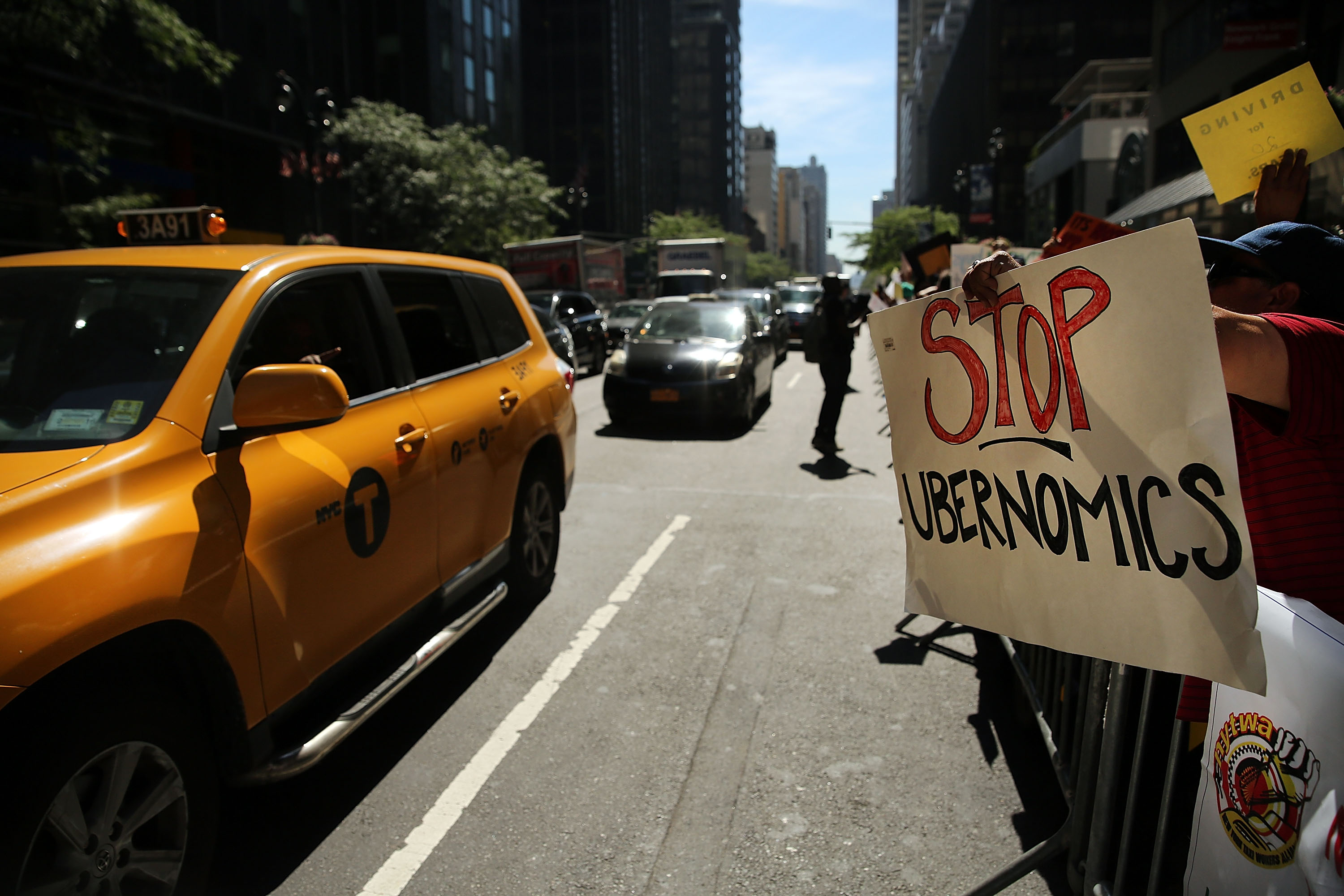The daily business briefing: August 9, 2018
New York caps ride-hailing licenses in blow to Uber, GOP Rep. Chris Collins charged with insider trading, and more


- 1. New York caps new ride-hailing licenses in blow to Uber, Lyft
- 2. Early Trump supporter Rep. Chris Collins charged with insider trading
- 3. Tribune withdraws plans for $3.9 billion merger with Sinclair
- 4. Rite Aid and Albertsons ditch $24 billion merger plan
- 5. Saudi Arabia escalates financial pressure on Canada over criticism
A free daily email with the biggest news stories of the day – and the best features from TheWeek.com
You are now subscribed
Your newsletter sign-up was successful
1. New York caps new ride-hailing licenses in blow to Uber, Lyft
New York on Wednesday became the first major U.S. city to temporarily stop issuing new vehicle licenses for Uber, Lyft, and other ride-hailing services. The City Council overwhelmingly approved capping the services for a year while the city's Taxi and Limousine Commission examines the industry. The legislation also authorizes the city to set drivers' minimum pay rates. New York's aggressive move poses a new obstacle to Uber's efforts to move past recent negative publicity about its corporate culture, and continue to grow. Uber has been valued at $62 billion, and is aiming for an initial public offering of stock next year. Corey Johnson, the City Council speaker, said the bills would help lift low driver wages and "stop the influx of cars contributing to the congestion grinding our streets to a halt."
2. Early Trump supporter Rep. Chris Collins charged with insider trading
Federal prosecutors on Wednesday arrested Rep. Chris Collins (R-N.Y.) on insider trading charges. Collins, who was President Trump's first congressional supporter, is accused of tipping off his son, Cameron Collins, about confidential corporate information he heard at a congressional picnic at the White House last year. Collins allegedly heard that Innate Immunotherapeutics, a biotechnology company, had received disappointing news regarding a key drug trial, and frantically passed it on to his son. Cameron Collins and several others used the tip to avoid more than $700,000 in losses, prosecutors said. Rep. Collins turned himself in to the FBI. He later told a judge in a Manhattan federal court, "I plead not guilty," and his lawyers said he would be "vindicated and exonerated."
The Week
Escape your echo chamber. Get the facts behind the news, plus analysis from multiple perspectives.

Sign up for The Week's Free Newsletters
From our morning news briefing to a weekly Good News Newsletter, get the best of The Week delivered directly to your inbox.
From our morning news briefing to a weekly Good News Newsletter, get the best of The Week delivered directly to your inbox.
3. Tribune withdraws plans for $3.9 billion merger with Sinclair
Tribune Media said Thursday that it would scrap its $3.9 billion merger with Sinclair Broadcast Group and sue Sinclair for "breach of contract." Tribune says Sinclair promised to make a reasonable attempt to get prompt regulatory approval, but conducted unnecessarily aggressive and slow negotiations with the Justice Department and the Federal Communications Commission. The deal began to unravel last month when the FCC raised "serious concerns" about the merger, which would have created a company reaching up to 70 million households. Sinclair had said the merger would be "transformational." Tribune CEO Peter Kern said in a statement that the FCC referred "the issue of Sinclair's conduct" for a special hearing, creating unacceptable "uncertainty and delay."
Fox Business The Washington Post
4. Rite Aid and Albertsons ditch $24 billion merger plan
Rite Aid and Albertsons said late Wednesday that they had mutually agreed to call off their planned merger, which was announced in February and valued at $24 billion. The deal had faced resistance from investors, including some who said the deal undervalued pharmacy chain Rite Aid. The decision still came as a surprise. Grocery giant Albertsons said it stood behind the deal, and its board had declined to change any of its terms. "While we believed in the merits of the combination with Albertsons, we have heard the views expressed by our stockholders and are committed to moving forward and executing our strategic plan as a stand-alone company," Rite Aid chief executive John Standley said.
A free daily email with the biggest news stories of the day – and the best features from TheWeek.com
MarketWatch The Wall Street Journal
5. Saudi Arabia escalates financial pressure on Canada over criticism
Saudi Arabia on Wednesday stepped up its financial retaliation against Canada for criticizing the kingdom and calling for the release of imprisoned rights activists, including two with relatives in Canada. Saudi Arabia, which already kicked out Canada's ambassador and recalled its own from Canada, called home doctors, patients, and students from institutions in Canada. Earlier, the Saudi government announced it would suspend flights by Saudia, the national carrier, to Canadian airports as of Monday. It also said it would stop buying Canadian barley and wheat. Canadian Prime Minister Justin Trudeau said his government would continue to "speak strongly, firmly, clearly, and politely about the need to respect human rights at home and around the world." The Saudi foreign minister said mediation was pointless, and that Canada needed to "fix its big mistake."
Harold Maass is a contributing editor at The Week. He has been writing for The Week since the 2001 debut of the U.S. print edition and served as editor of TheWeek.com when it launched in 2008. Harold started his career as a newspaper reporter in South Florida and Haiti. He has previously worked for a variety of news outlets, including The Miami Herald, ABC News and Fox News, and for several years wrote a daily roundup of financial news for The Week and Yahoo Finance.
